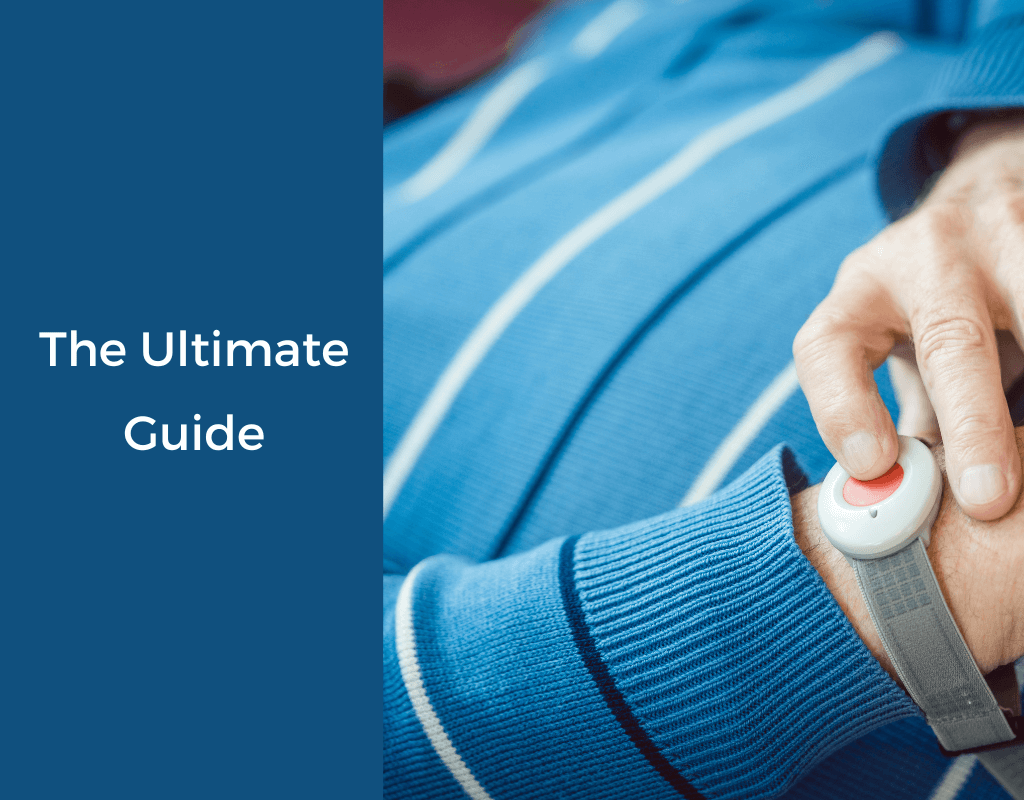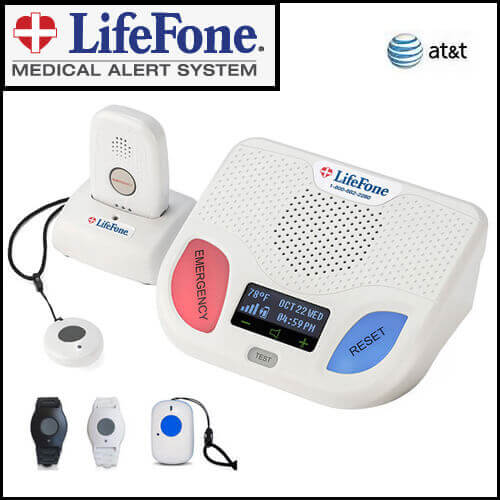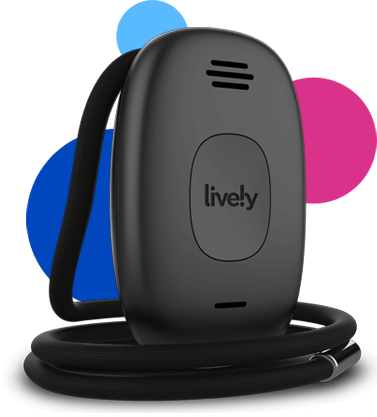My mom laid on the floor with a broken leg for 8 hours until my dad found her the next morning. She was in the kitchen and tried to transfer from the island to the sink but her leg snapped and she fell. I still can’t get that memory out of my head. I don’t want anyone else to experience that so I wrote this ultimate guide to senior fall alert systems.
Consider this…according to the Centers for Disease Control and Prevention (CDC), one out of four Americans aged 65 and above falls each year. These falls can lead to serious injuries, such as broken bones or head trauma, and can be a threat to a senior’s ability to live independently. Falls are not just common among the elderly; they’re often the tipping point that leads to a significant decline in independence.
With technology becoming more sophisticated by the day, fall alert systems are evolving from simple wearable pendants to advanced devices boasting features like fall detection, GPS tracking, and two-way communication.
In this guide, I will explore the different types of fall alert systems, their benefits, and how to choose the right one for your loved one.
What Are Senior Fall Alert Systems
Senior fall alert systems are devices designed to detect falls and summon help automatically. They typically include a wearable device, such as a pendant or wristband, that can be activated manually or automatically in the event of a fall. These systems are connected to a monitoring center, emergency contacts, or both, ensuring prompt response to any emergency.
Types of Fall Alert Systems
Senior fall alert systems can fall into one of four categories:
Manual Fall Alert Systems: These systems require the user to press a button to call for help. They are simple to use but depend on the senior’s ability to activate the alert during an emergency.
Automatic Fall Detection Systems: These advanced systems use sensors and algorithms to detect falls automatically. If a fall is detected, the system sends an alert without the need for the user to press a button. This is particularly useful for seniors who may be unconscious or unable to activate the alert.
Mobile Fall Alert Systems: These systems include GPS technology, allowing the user to call for help both at home and on the go. They provide peace of mind for seniors who are still active and independent.
In-Home Fall Alert Systems: Designed for use within the home, these systems typically include a base station and wearable devices. They offer a reliable way to get help in case of a fall within the house.
Key Features to Consider
When choosing a fall alert system, consider the following features:
Automatic Fall Detection: Look for systems that offer automatic fall detection to ensure help is available even if the user cannot press the button.
Two-Way Communication: Systems with two-way communication allow the user to speak directly with a monitoring center or emergency contacts.
GPS Tracking: For active seniors, GPS tracking provides an added layer of security by allowing caregivers to locate them in case of an emergency.
Water Resistance: Since falls can happen anywhere, including the bathroom, a water-resistant device is crucial.
Battery Life: Long battery life ensures the device is always ready to use. Some systems come with rechargeable batteries, while others use replaceable ones.
Range: For in-home systems, ensure the device has sufficient range to cover the entire living area.
Choosing the Right Fall Alert System
It’s important to choose the fall alert system that is right for both the senior as well as family members and/or caregivers. Here are some things to consider when choosing the right system:
Assess Mobility and Health Needs: Consider the senior’s mobility, health conditions, and likelihood of falling. For those with higher risks, an automatic fall detection system may be best.
Evaluate Lifestyle: If the senior is active and frequently outside the home, a mobile system with GPS tracking would be ideal.
Check User-Friendliness: Ensure the device is easy to use and comfortable to wear. Seniors are more likely to use a device that they find convenient.
Read Reviews and Ratings: Look for systems with positive reviews and high ratings from other users and experts.
Consider Monitoring Services: Decide if you prefer a system connected to a professional monitoring service or one that alerts family and friends directly.
My Top Three Picks
MobileHelp Medical Alert
LifeFone Medical Alert
Lively Medical Alert
 MobileHelp offers a range of medical alert systems designed for both in-home and on-the-go use. Check out my detailed review of the MobileHelp Alert System. Here are some key features and options available:
MobileHelp offers a range of medical alert systems designed for both in-home and on-the-go use. Check out my detailed review of the MobileHelp Alert System. Here are some key features and options available:
In-Home Systems
- MobileHelp Classic: This system is ideal for those who stay mostly at home. It includes a base unit and a waterproof help button. It requires a landline connection
- MobileHelp Wired Home: This system uses a cellular connection, making it suitable for homes without a landline
On-the-Go Systems
- MobileHelp Solo: This system is great for active users. It includes a mobile unit with GPS tracking and a waterproof help button. Optional fall detection can be added for an additional $10 per month. .
- MobileHelp Micro: A smaller and lighter device that is water-resistant and includes advanced GPS for precise location tracking.
Hybrid Systems
- MobileHelp Duo: This system includes both in-home and mobile units, providing comprehensive coverage. It also has GPS tracking and can be paired with fall detection for $10 extra per month
- Mobile Duo: Designed for couples or roommates, this package includes two mobile devices equipped with GPS and two-way communication
Pricing
Plans run between $19.95 – $49.95 / month. There may be additional charges for add-ons like Fall Detection.
Pros:
- Wide range of devices and plans.
- No long-term contracts.
- Excellent mobile coverage and reliability.
Cons:
- Monthly fees can add up with additional features.
- Some users report connectivity issues in rural areas.
LifeFone provides versatile and affordable medical alert systems with a focus on user-friendly design and robust features.
Key Features:
- Fall Detection Pendant: Optional fall detection technology.
- At-Home and On-the-Go Solutions: Offers systems for both in-home and mobile use.
- GPS Tracking: Available with mobile devices for accurate location tracking.
- Water-Resistant: Devices can be worn in the shower.
- Caregiver Tools: Includes features like activity tracking and caregiver alerts.
Pros:
- Affordable pricing and flexible plans.
- No long-term contracts required.
- Highly rated customer service.
Cons:
- Fall detection is an optional feature, requiring an additional fee.
- The mobile unit can be bulky for some users.
Pricing:
Monthly pricing starts at $24.95 for At-Home systems and $39.95 for On-The-Go systems.
Lively, formerly known as GreatCall, is a well-regarded provider of medical alert systems, known for its innovative approach and user-friendly devices.
Key Features
Lively Mobile Plus
- All-in-One Device: Combines fall detection, GPS tracking, and two-way communication in a single portable device.
- Water-Resistant: The device is water-resistant, suitable for use in the shower or bath.
Lively Wearable2
- Smartphone Integration: Pairs with a smartphone to provide medical alert functionality through a wearable device.
- Urgent Response Button: Pressing the button connects users to Lively’s 5Star Urgent Response Service.
- Fitness Tracking: Includes features to track steps and daily activity.
- Fall Detection: Available when paired with certain smartphones.
- Stylish Design: Can be worn as a pendant or on the wrist, making it both functional and stylish.
Lively Health and Safety Services
- 5Star Urgent Response: 24/7 access to highly trained agents who can provide assistance in emergencies, contact family members, or dispatch emergency services.
- Lively Link App: Allows caregivers to stay connected and informed about the health and safety of their loved ones. Caregivers can receive alerts and updates about the user’s activity and device status.
- GreatCall Rides: A partnership with Lyft to offer a convenient ride service for users who need transportation to appointments or other destinations.
- Personal Operator: Provides concierge services to help with daily tasks, such as making appointments and finding addresses.
Pros
- Comprehensive Features: Combines medical alert, fitness tracking, and smartphone integration in one system.
- Reliable Emergency Response: The 5Star Urgent Response service is highly rated for its quick and professional assistance.
- Mobile and Versatile: The devices are designed for both in-home and mobile use, making them suitable for active seniors.
- Easy to Use: User-friendly design and straightforward operation.
- Additional Services: Offers extra services like the Lively Link app and GreatCall Rides, enhancing the overall caregiving experience.
Cons
- Monthly Fees: Requires a monthly subscription for monitoring services, which can add up over time.
- Smartphone Dependency: The Lively Wearable2 requires a compatible smartphone for full functionality, which may not be ideal for all users.
- Limited Device Options: Compared to some other providers, the range of devices is more limited.
Pricing:
Lively medical alerts systems start at $24.99 per month for monitoring services—the price for Mobile Plus, Apple Watch, and Alexa devices. Your monthly price will depend on whether you choose the basic package ($24.99) or the premium package for $10 more ($34.99).
Here’s a little transparency: Our website contains affiliate links. This means if you click and make a purchase, we may receive a small commission. Don’t worry, there’s no extra cost to you. It’s a simple way you can support our mission to bring you quality content.
Recommended For You

Elderly Fall Prevention Tips
One-third of seniors over the age of 65 will fall this year and only half of them will tell their doctor about it, according to the Centers for Disease Control …

Father’s Day Gift Ideas For an Older Dad
Father’s Day is one of those holidays that get more special as dad gets older. It’s a time to reflect on how important he is as well as on the …

Caregiver Employment Application Form
Having your applicants complete a caregiver employment application form is an important first step in the hiring process. In this article I will share with you why the application is so important and how to best use it to find the perfect caregiver. You can also find an application form

How to Monitor an Elderly Parent
Are you worried that your elderly parent is struggling to remain independent and that you can’t be there every day to make sure they are safe? There are millions of …

How To Pay For In-Home Care
Although the cost for in-home care is usually a less expensive option than Assisted Living or Nursing Homes, the ability to afford Home Care is an important consideration. Most in-home …

Caregiver’s Bill of Rights
I HAVE THE RIGHT… To take care of myself. This is not an act of selfishness. It will give me the capability of taking better care of my loved one. To seek help from others even though my relatives may object. I recognize the limits of my own endurance and






